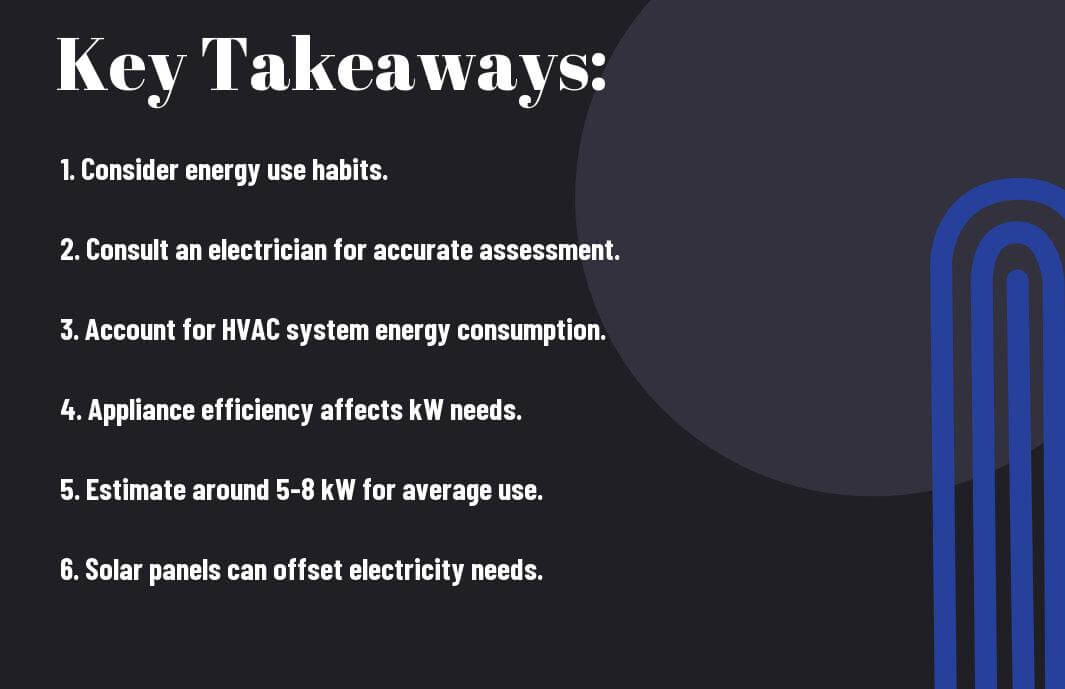In the matter of powering your house, understanding how many kilowatts you need for a 2000 square foot house is crucial. Factors like appliances, lighting, and heating/cooling systems play a significant role in determining your energy consumption. If you’re wondering about the kilowatt requirements for a 2000 square foot house, check out this How many kilowatts does a 2000 square foot house use? resource for more insights.
Key Takeaways:
- Calculate the energy demand: To determine how many kW you need to run a 2000 square foot house, you will first need to calculate the energy demand based on the appliances and electronics you use.
- Consider energy efficiency: Investing in energy-efficient appliances and practices can help reduce the overall kW needed to run your house, saving you money on electricity bills in the long run.
- Consult with a professional: For a more accurate assessment of your kW needs, consider consulting with an electrician or energy specialist who can provide personalized recommendations based on your specific household needs.

Determining Your Energy Needs
Calculating Your Home’s Energy Consumption
The first step in determining how many kilowatts (kW) you need to run a 2000 square foot house is to calculate your home’s energy consumption. Homes consume energy through various appliances such as refrigerators, TVs, air conditioners, lights, and more. By looking at the energy usage of each of these devices, you can estimate your total energy consumption.
Factors Affecting Energy Requirements
Calculating your energy needs also involves considering factors that affect your energy requirements. These factors include the size of your house, its insulation levels, the climate in your region, your energy usage habits, and the efficiency of your appliances. The more energy-efficient your appliances are, the less power your home will require to operate. The location of your house also plays a significant role in determining your energy needs.
- The size of your house and its insulation levels impact how much energy is needed to heat or cool your home.
- The climate in your region determines the amount of energy required for heating or cooling throughout the year.
- Your energy usage habits, such as turning off lights when not in use or adjusting the thermostat, can affect your overall energy consumption.
To accurately determine the kilowatts needed to run a 2000 square foot house, you need to consider all these factors in your calculations. By understanding your home’s energy consumption and the various factors that influence your energy requirements, you can make informed decisions to meet your energy needs efficiently and sustainably.
Sizing Your Electrical System
Little do you know, properly sizing your electrical system is crucial to ensure that your 2000 square foot house is powered efficiently and safely. In the context of determining how many kilowatts (kW) you need, you’ll need to start with load calculations.
Load Calculation Methods
With load calculation methods, you can determine the electrical load your house will require based on factors such as the size of the house, the number of appliances, lighting fixtures, and other electrical devices you plan to use. By using either the ‘unit’ or ‘diversity’ method, you can accurately estimate the total kW needed to power your 2000 square foot house.
Importance of Accurate Load Calculations
Load calculations are necessary in ensuring that your electrical system is not underpowered or overloaded. By accurately calculating the electrical load for your house, you can avoid potential safety hazards such as electrical fires or circuit overloads. Additionally, an accurate load calculation can help you size your electrical system correctly, saving you money on installation and operational costs in the long run.
To ensure that your electrical system is optimized for your 2000 square foot house, it’s crucial to conduct precise load calculations. By accurately determining the electrical load your house requires, you can avoid potential issues such as circuit overloads or power shortages. Investing the time and effort into calculating your load accurately will pay off in the long run, providing you with a safe and efficient electrical system for your home.

The Role of Square Footage
Many factors come into play when determining how many kilowatts you need to run a 2000 square foot house efficiently. The size of your home is a crucial element that directly impacts your energy needs.
How Square Footage Impacts Energy Needs
Any increase in square footage means more space that needs to be heated, cooled, and lit, leading to higher energy consumption. A larger house requires more kilowatts to power appliances, electronics, and lighting, resulting in higher electricity bills.
Other Factors That Influence Energy Consumption
- The age and efficiency of your appliances and HVAC system play a significant role in your home’s energy consumption. Older appliances tend to be less energy-efficient, leading to higher electricity usage.
- The insulation and sealing of your home impact how well it retains heat or cool air, affecting your energy needs. Proper insulation can reduce the amount of kilowatts required to maintain a comfortable temperature in your home.
Knowing the condition of your appliances and the effectiveness of your home’s insulation can help you determine the kilowatt capacity needed to power your 2000 square foot house efficiently.
This information emphasizes the importance of not just the square footage of your home, but also how various factors influence your energy consumption. By considering these elements, you can make informed decisions to optimize your energy usage and reduce electricity costs.
Appliance and Lighting Loads
Estimating Appliance Energy Usage
After determining the total energy needs of your 2000 square foot house, the next step is to estimate the energy usage of your appliances. Your refrigerator, dishwasher, washing machine, dryer, and other appliances all contribute to your overall energy consumption. You can find the energy usage information for each appliance in its manual or on the manufacturer’s website.
Lighting Loads and Their Impact
On average, lighting accounts for about 10% of a household’s energy usage. To estimate the lighting load for your 2000 square foot house, you can use a simple formula: multiply the total square footage by 1.5 watts. For example, for a 2000 square foot house, the estimated lighting load would be 3000 watts. LED bulbs are more energy-efficient than incandescent bulbs, so consider replacing your old bulbs with LEDs to reduce your lighting energy consumption.
Loads contribute significantly to your overall energy usage, and making simple changes like switching to energy-efficient lighting options can help reduce your energy bills and your carbon footprint. Consider using natural light during the day and installing dimmer switches to adjust lighting levels based on your needs, further optimizing your energy usage.
Appliance
Regularly maintaining your appliances, such as cleaning the refrigerator coils and dryer vents, can help improve their energy efficiency. Additionally, using appliances during off-peak hours and investing in energy-efficient models can further reduce your energy consumption. Being mindful of your appliance usage and implementing energy-saving practices can make a significant difference in lowering your overall energy needs to run your 2000 square foot house efficiently.

HVAC and Water Heating Loads
Heating and Cooling System Efficiency
Water heating and HVAC (heating, ventilation, and air conditioning) are two major energy-consuming systems in your home. In the matter of heating and cooling, the efficiency of your system plays a crucial role in determining how much energy is required to maintain a comfortable temperature in your 2000 square foot house.
Your heating and cooling system’s efficiency is measured by its SEER (Seasonal Energy Efficiency Ratio) for cooling and AFUE (Annual Fuel Utilization Efficiency) for heating. A higher SEER or AFUE rating indicates a more efficient system that consumes less energy to produce the same level of heating or cooling in your house. Upgrading to a more efficient system can help reduce your overall energy consumption and save you money in the long run.
Water Heater Energy Consumption
With water heating being the second largest energy expense in most homes, it’s imperative to consider the energy consumption of your water heater when calculating the kW needed to run your 2000 square foot house. The energy consumption of your water heater is influenced by factors such as the type of heater, tank size, and usage habits.
Understanding the energy efficiency of your water heater can help you make informed decisions about your household energy consumption. For example, opting for an energy-efficient water heater or implementing energy-saving practices like reducing hot water usage can help lower your overall energy requirements.
Electrical System Components
Service Entrance and Main Breaker
On your quest to understand how many kW you need to run a 2000 square foot house, it’s imperative to grasp the key components of the electrical system. The service entrance is where your home connects to the utility grid, and it typically includes a main breaker that controls the flow of electricity into your house. This breaker is crucial as it can trip in case of an overload, protecting your home from electrical fires and damage.
Branch Circuits and Subpanels
Components such as branch circuits and subpanels play a vital role in distributing power throughout your home. Branch circuits are the pathways through which electricity flows to different areas, like your living room or kitchen. Subpanels act as mini distribution centers, allowing you to expand the number of circuits in your home beyond what the main breaker can handle. This setup is especially useful for larger homes where a single panel may not be sufficient to power all the necessary appliances and devices.
Conclusion
From above, you now have a better understanding of the factors to consider when determining how many kW you need to run a 2000 square foot house. Remember that the size of your house, the climate you live in, the efficiency of your appliances, and your personal energy usage habits all play a significant role in this calculation. By conducting a thorough energy audit and consulting with a professional, you can accurately determine the right kW capacity for your home.
Ensuring that you have the correct kW capacity will not only help you avoid overpaying for an oversized system but also prevent the risk of an undersized system leading to frequent outages or overloading. By taking these steps, you can optimize your energy usage, reduce your carbon footprint, and create a more sustainable and efficient home for yourself and your family.
FAQ
Q: How do I determine how many kW I need to run a 2000 square foot house?
A: To determine how many kW you need to run a 2000 square foot house, you will first need to calculate the total energy consumption of the house based on the appliances, electronics, and lighting you plan to use. This can be done by adding up the wattage of each device and dividing by 1000 to convert to kilowatts.
Q: What factors should I consider when calculating the kW needed for a 2000 square foot house?
A: When calculating the kW needed for a 2000 square foot house, you should consider factors such as the insulation of the house, climate conditions, the efficiency of the appliances, the number of occupants, and the frequency of appliance use. These factors will help you determine the overall energy consumption and therefore the kW needed to power the house.
Q: Is it advisable to consult with a professional to determine the kW requirements for my 2000 square foot house?
A: Yes, it is highly advisable to consult with a professional, such as an electrician or energy consultant, to accurately determine the kW requirements for your 2000 square foot house. They can conduct an energy assessment of your home, consider all the necessary factors, and provide you with the most accurate information and recommendations for your specific needs.
